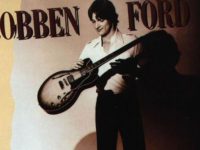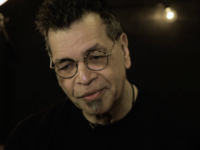Dave Haskell is back, which is undoubtedly significant news for longtime followers of the San Francisco Bay Area’s jazz and blues scenes. And if you’re a fusion fan from any other locale, then let me tell you why that should be significant to you, too.
Haskell grew up in a small town in Northern California called Ukiah, which happened to be the same town that the Ford brothers — Mark, Patrick and Robben — grew up in around the same time. From his Dad’s Ellington and Basie records, Haskell learned to love jazz, but the Fords gave him a love for the blues, and those two influences shaped his music career. Haskell developed his guitar chops filling in for Robben’s Ukiah blues band and then he moved down to the San Francisco Bay Area and played in another blues band there. Afterwards, he worked with a succession of jazz musicians, like Larry Vuckovich and fusion notable Mike Nock before beginning his run playing in bands led by another jazz-rock pioneer, saxophonist Jim Pepper. Also in that band was an unknown keyboardist named Russell Ferrante. Somewhere along the way he met Jimmy Haslip and became longtime friends with him, too. Ferrante and Haslip went on to help out Robben Ford with his early career triumph The Inside Story before the three had formed the Yellowjackets with drummer Ricky Lawson in the early 80s.
Meanwhile, Haskell began to lead his own fusion group while working with Jeff Lorber and revisiting the blues within Mark Ford’s band. By the mid-80s, Haskell had enough of the musician’s life and made a career change in favor of his other passion, aviation. That led to a stint as a commercial pilot for a major airline, but eventually, music making lured him back and now as a retired pilot, Haskell has re-launched his first career. He and his new Dave Haskell Group are capping the return with a new record poised for release week. It’s called Pivot Point.
Pivot Point capitalizes not only on the wealth of experience Haskell accumulated before he took to the skies, but also the relationships. Haslip produced this record for the Group, which also includes Dan Zemelman (piano, keyboards), Aaron Germain (electric and acoustic bass) and Alan Hall (drums). Some fusion guitarists lean more toward performance and others tilt in favor of compositions, but Haskell minds both sides of the musicians’ ledger. He’s a sophisticated and savvy enough composer who knows how to put in hooks that don’t give short shrift to the detail in the little harmonic turns he puts into songs that challenge he and his crew. There are unison lines to be found everywhere — especially with Zemelman’s single note synth – and used as a tool to put memorable themes in the listener’s mind. Haslip’s production manages to give record a timeless fusion feel, sounding modern but not trendy, keeping the synthesizers at bay and enabling a tight, band sound to materialize. In many spots, the album has the sound of Ford’s contemporary Larry Carlton, especially Carlton’s late 70s/early 80s Warner Brothers records.
It’s a very, very consistent album, and “Agnes” signals that this is going to be a delight. Haskell gets a wonderful full-bodied tone from his electric semiacoustic guitar, easing through brightly colored lines with Zemelman’s synth very tastefully. It’s a melodic piece with many gears and seamless shifting. “Mamba Samba” is a samba as advertised, and it’s notable for some Haskell’s agile procession of notes on his solo; Haskell is quick enough but not a speed demon, he instead prefers to make each note count. “An Orchid for Emily (for Emily Remler)” is a slower minor key tune where he displays that great tone, which, come to think of it, does have a lot of similarity to Remler’s.
“Second Look” is the first of the four songs on which at least two of the original Yellowjackets — Ferrante and Haslip — guest perform. “Second Look” sports an alluring soulful pairing of Haskell and Ferrante’s organ, while Haslip does his signature heavily anchored lively bass line. “Thirty West By Seventy” has a more relaxed, Steely Dan type of groove, and features Ferrante’s underrated piano improvisation abilities.
For two more tunes, Robben Ford along with Robben Ford Band drumming ace Toss Panos add to an already star-studded lineup, and the songs live up to the billing. “For The Moment” features Robben on left channel and Haskell on right, both skating in unison over a funky beat. During the solo break, Ford is his usual world class self, and while Haskell isn’t quite on that level (very few are, to be fair), he more than holds his own. Ford brought his own composition “Monty” to the sessions, a jazzy, Latin inflected number that boasts competing octaves. I don’t ever recall hearing that before, but it sure does sound nice.
The album ends with Haskell’s Group returning for the only other non-Haskell tune of the record, Herbie Hancock’s “Eye Of The Hurricane.” Hancock’s classic song from Maiden Voyage is converted into a hard-swinging blues based burner, and backed by this all-acoustic rhythm section, Haskell proves that he still knows his way around bop as well as he does fusion jazz. Germain, Zemelman and Hall get to turn in some stimulating solo turns as well.
Usually when I come across fusion record like this, there are inevitably some “uh oh” moments in the record where there’s some inexplicably mediocre tracks that spoil the good vibes created from the premium ones. Not so here; the only moments found here are the good ones. While nothing about Pivot Point is groundbreaking, records as solid as this one are just as hard to find. Haskell may have put away his wings, but he’s still soaring.
Pivot Point is set for release March 26. Visit Dave Haskell’s website for more info.
[amazon_enhanced asin=”B00BPIDYOA” /] [amazon_enhanced asin=”B00AJLHULW” /] [amazon_enhanced asin=”B000006YRP” /] [amazon_enhanced asin=”B004KBSQMY” /] [amazon_enhanced asin=”B00AMHFN5S” /]
- Soft Machine – ‘Drop’ (1971, 2025 remaster) - May 21, 2025
- Marshall Allen’s Ghost Horizons – ‘Live In Philadelphia’ (2025) - May 19, 2025
- Satoko Fujii This Is It! – ‘Message’ (2025) - May 14, 2025



